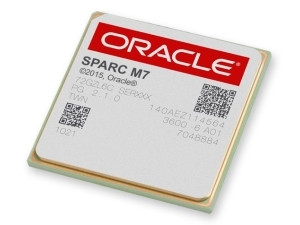
Oracle announced new Sparc processors and servers, and a new version of the Solaris operating system, at Oracle OpenWorld in San Francisco.
The M7 processor features a number of in-silicon enhancements for improving security and database performance. The company continues to invest in Sparc despite a steadily deepening relationship with Intel.
Most of Oracle's general-purpose computing systems are Intel x86-based, but Sparc remains the platform of choice for Oracle's engineered systems for specific workloads.
In conjunction with the new processors, Oracle introduced new SuperCluster T-series and M-series server platforms built around the M7 processors. The servers are already in use within Oracle's own public cloud data centres, says the company.
The M-series scales to half the number of processors of its M6 predecessor - 16 sockets - a decision driven by soft demand for the very large configurations of the M6. The M7 processor has 32 cores compared to 12 in its M6 predecessor, with a clock speed of 4.1GHz - 15% faster - as well as increased cache and memory bandwidth.
But the raw performance is only part of the story. The M7 offers key features in silicon to improve performance and security. "SQL in silicon" adds co-processors to each core, to offload and accelerate specific data functions, such as de-compression, data scanning, filtering, and joins.
Oracle claims 10x performance improvements under optimal conditions. The chips also offer hardware-assisted encryption to speed up data encryption, and silicon secured memory, which locks assigned memory to its parent application and prevents malicious intrusion or accidental leakage.
Oracle Database 12c is required for most of the advanced capabilities, though silicon secured memory can be easily enabled for any application, Oracle says.
Share